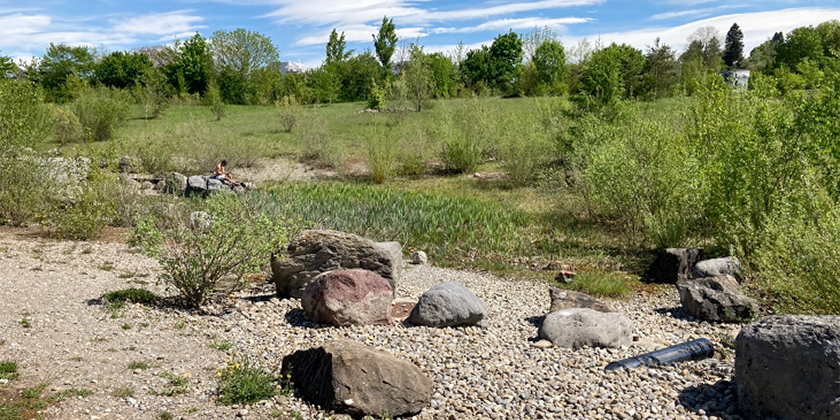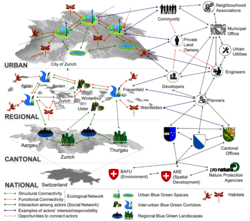Department Environmental Social Sciences
BlueGreenNet: Social-ecological networks to enhance biodiversity in peri-urban regions

This project contributes to the implementation track projects of the Blue Green Biodiversity Research Initiative – an Eawag-WSL collaboration focusing on Biodiversity at the interface of aquatic and terrestrial ecosystems.
One of the greatest social-ecological challenges of the Anthropocene is the mitigation of and adaptation to consequences of unprecedented rates of urbanization, which is advancing primarily at the expense of natural environment. Loss of habitat area, habitat quality and habitat fragmentation due to ever increasing anthropogenic pressure has been linked to severe biodiversity loss. Such global crisis is a matter of high concern not only for ecological reasons but also seriously threatens ecosystem services essential for humans.
Peri-urban Blue-green areas (BGA) are ascribed to provide spatially distributed habitats for biodiversity, and, at the same time, to increase and maintain the resilience of densely populated ecosystems to mitigate major environmental challenges of the 21st century (e.g. population growth, limited resources, pollution, growing impacts of climate change). BGA encompass a broad range of habitat types ranging between e.g., short-term vacant lots, parks, riverbeds, lakeshores, forests and agricultural land. Such spatially distributed BGA are key ingredients of Blue-Green Infrastructure (BGI) as they represent nodes of blue-green habitat networks that support biodiversity. However, the spatial dynamics and connectivity of BGA networks are complex: constantly changing, interacting social, ecological and environmental factors challenge the successful management of BGA to support blue-green infrastructure. Social-ecological networks (SEN) provide an innovative conceptual and methodological approach designed to disentangle and analyze complex interdependencies between social and ecological systems.
Using SEN, BlueGreenNet will aim to identify, quantify and evaluate the social-ecological structure of BGA networks to support BGI and to identify transformation pathways for more sustainable ecosystem governance in peri-urban regions in Switzerland. The Cantons of Aargau and Zürich, characterized by distinct human settlements patterns, are taken as case studies. The project aims to investigate how in human-dominated landscapes (HDL) we can enhance biodiversity through two major research questions:
What are emerging structures from empirically validated, cross-scale (e.g. urban-rural) and multi-level (e.g. multi-species and multi-actor) social-ecological networks (SEN)?
What are transformation pathways towards more sustainable and persistent blue-green infrastructure?
Progress happens by bringing people together that have the drive and the influence to make positive changes happen. An entire work package deals with the inclusion of actors, from the beginning to the end of the project to inform, develop and evaluate transformation pathways. These transformation pathways can steer sustainable development in peri-urban regions in order to mitigate current and future challenges related to blue-green biodiversity infrastructure and bridge collaboration among different actors.
External team members
PD. Dr. Janine Bolliger (WSL)
Achilleas Psomas (WSL)
Adrienne Grêt-Regamey (ETH)
Loic Pellissier (WSL)





